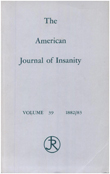Early nonresponse to fluoxetine as a predictor of poor 8-week outcome
Abstract
OBJECTIVE: The purpose of this study was to quantify the proportion of patients who show no response to a fixed dose of fluoxetine after 2, 4, and 6 weeks of treatment and then respond by week 8. METHOD: In an open trial, 143 outpatients who met DSM-III-R criteria for major depressive disorder were treated with a regimen of fluoxetine, 20 mg/day. The authors analyzed the proportion of patients who had less than a 20% decrease from baseline in their scores on the Hamilton Rating Scale for Depression after 2, 4, and 6 weeks and who went on to have a 50% or greater reduction by week 8. A last-observation-carried-forward strategy was used to calculate conditional probabilities of 8-week response. Kaplan-Meier survival analysis was used to estimate probabilities of response at week 8 given degrees of response at week 2. RESULTS: Eighty-two subjects (57.3%) who started the trial responded by week 8. Of those subjects who showed no improvement at weeks 2, 4, and 6, the proportions of responders at week 8 were 36.4%, 18.9%, and 6.5%, respectively. The Kaplan-Meier estimate of 8-week response given nonresponse at week 2 was 0.45. CONCLUSIONS: The proportion of patients with no response to antidepressant treatment by 4 or 6 weeks who responded by week 8 was substantially less than that for subjects who had at least a partial response. Nonresponse as early as week 2 predicted 8-week outcome.
Access content
To read the fulltext, please use one of the options below to sign in or purchase access.- Personal login
- Institutional Login
- Sign in via OpenAthens
- Register for access
-
Please login/register if you wish to pair your device and check access availability.
Not a subscriber?
PsychiatryOnline subscription options offer access to the DSM-5 library, books, journals, CME, and patient resources. This all-in-one virtual library provides psychiatrists and mental health professionals with key resources for diagnosis, treatment, research, and professional development.
Need more help? PsychiatryOnline Customer Service may be reached by emailing [email protected] or by calling 800-368-5777 (in the U.S.) or 703-907-7322 (outside the U.S.).



